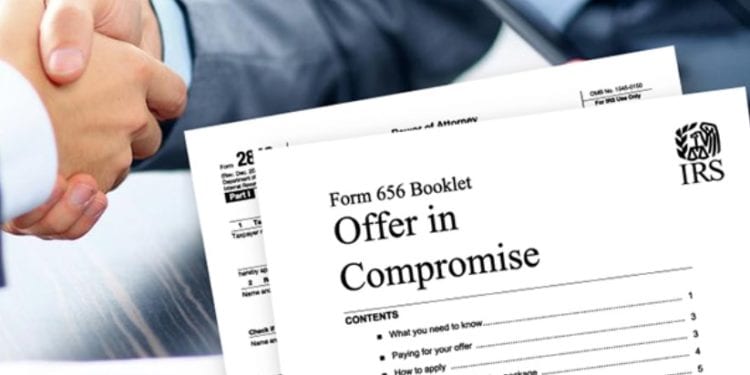The offer in compromise (OIC), known as the offer, is a viable option for paying your taxes at a significant discount and wiping your tax slate clean. The Internal Revenue Service (IRS) will allow you, the taxpayer, to pay less than the actual amount owed on your tax returns and then call it even.
But before you call your tax advisor at Jackson Hewitt (which can be quite pricey as shown here) with excitement in your heart, you should take a step back. We cannot overemphasize that the offer is a privilege granted to taxpayers, not a legal right – the offer may or may not be granted by the bigwigs at the IRS since it’s completely a matter of government discretion.
If you play your cards right, fortunately, you may be one of the lucky thousands who have taken advantage of the offer program. The IRS also seems to be in a benevolent mood with more than 40% of submitted offers approved, and it’s a trend that you can take advantage of.
The current political climate has restricted the IRS somewhat, which means the taxpayers should take advantage of this before it changes. As we all know, politics can change overnight, and with them come new laws that increase our tax liability and empower the IRS to look at each taxpayer with more scrutiny.

Prerequisites for Offer
Keep in mind that the IRS in particular and the government, in general, will not want every taxpayer to enjoy the privilege of an approved offer. Every taxpayer who wants to the benefit of it should meet the following conditions even to be considered – and remember that being found doesn’t automatically mean being approved.
The conditions are:
- The IRS has some doubts that it can collect your taxes due, whether in the present or the foreseeable future, for any valid reason. This is called doubt as to collectability, and the IRS has its own criteria for determining it.
- The IRS deems that the collection of taxes will cause the affected taxpayer economic hardship and/or will be inequitable or unfair. These can be due to exceptional circumstances that the IRS staff should be able to see clearly.
- The IRS approves an offer submitted by the affected taxpayer on the grounds of doubt as to liability. Here, the taxpayer claims that the assessed tax liability is correct and, thus, the IRS is placed in an awkward situation. For this reason, it’s rarely used, and it’s a more challenging option to take.
You can initially determine your qualification for an offer by using the online pre-qualifier tool on the official IRS website. Be as honest and thorough as possible in your answers because the taxman will likely use the information against your case.
Also, the IRS has a soft heart, so to speak, for people with physical and/or psychological disabilities applying for the offer program. Elderly people, for example, have a higher chance of being approved, as is the case for taxpayers with health problems, such as HIV or addiction, and for those who have dependent family members with these conditions.
Having said that, if you do not qualify, you simply do not qualify. There is no way to fake your qualification for Offer in Compromise, and if you are caught lying about certain details, it can be considered tax fraud. Tax fraud is a felony in the United States and can be punishable by up to five years in prison. As the old Benjamin Franklin saying goes, there are only two things certain in life, and that is death and taxes.

Process Explained
Like most things regarding taxes and the taxman, there’s a formal process involved in the offer in compromise agreement. To summarize it:
- Complete Form 656 (Offer in Compromise). Be thorough in completing the form as even a single missed or incorrect entry can delay your paper’s movement through the process, even result in your prayer for offer’s disapproval.
- Pay the application filing fee; be sure to attach the payment to the form. Ask about a possible exemption from the fee, such as when your monthly income falls below the poverty guidelines. A filled-up Application Fee Worksheet should be attached if you claim said exemption.
- Provide detailed financial information through Form 433-A for an individual or Form 433-B for a business. The Collection Information Statement may also include information about your spouse if you are married and live in a state with community property laws, even if you’re the only one owing to the IRS.
You will then have to wait for the IRS’s action on your proposal. But remember that you have to be proactive since the IRS will ask for more financial information to support your proposal. This can mean the submission of bank records, pay stubs, and vehicle registration, among others, since the IRS will conduct a relatively exhaustive investigation into your finances.
Don’t be surprised if you end up spending more time and energy than you first envisioned when you filed for the application. Don’t be surprised either if you submitted several boxes of documents to the IRS.
And then there’s also the fact that whatever you submit financial information to the IRS, it can be used by against you! Your financial disclosures may just be the weapon that the IRS needs in speeding up its collection efforts, and you end up paying your tax bill, even paying more if the IRS deems that you cheated on your returns.
If you have some financial ghosts in your closet, even if you know it is perfectly legal, you might not want to go along with Offer in Compromise. It would not be a fun experience to go in thinking you’ll get a tax reduction and then be faced with an IRS tax audit.
You should also consider that as your proposal of an offer in compromise is in the IRS system, the interest will accrue on your taxes due. You may just end up owing more than the tax amount on your return.
The bottom line: Proceed with caution when using the offer in compromise to win a victory, of a sort, against the taxman.





